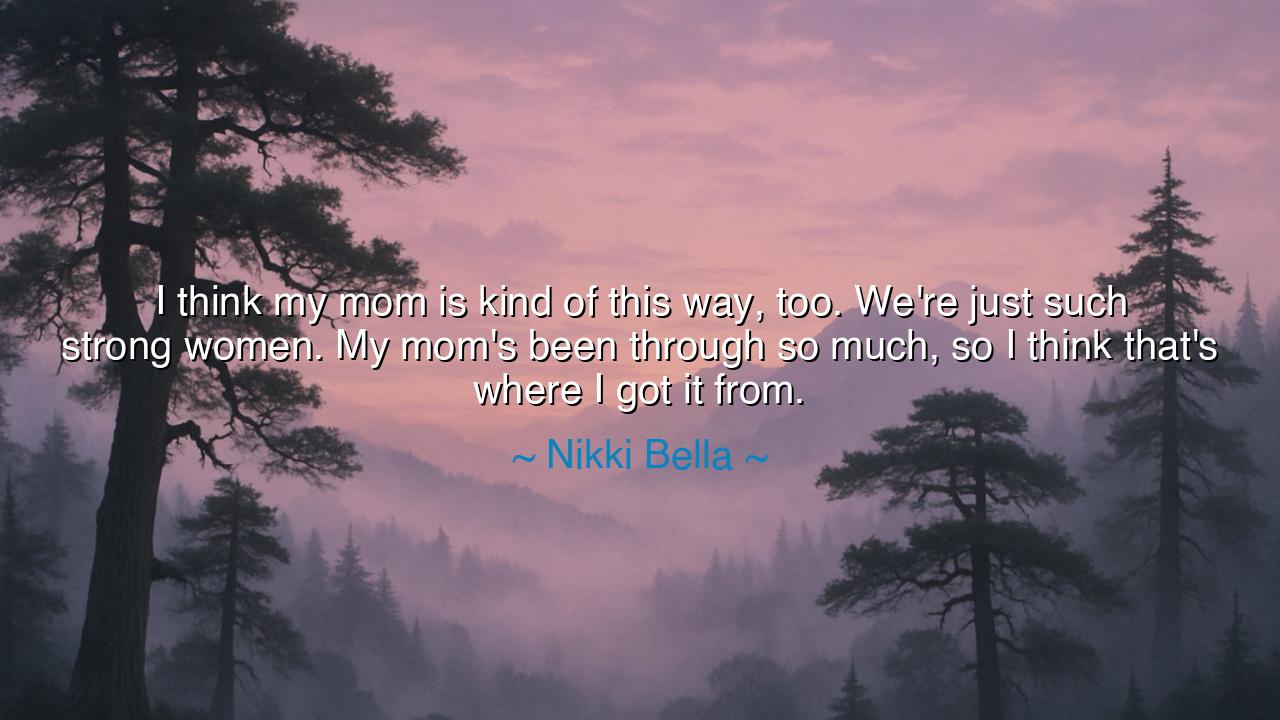
I think my mom is kind of this way, too. We're just such strong
I think my mom is kind of this way, too. We're just such strong women. My mom's been through so much, so I think that's where I got it from.






Nikki Bella, with the voice of a daughter honoring her roots, once said: “I think my mom is kind of this way, too. We’re just such strong women. My mom’s been through so much, so I think that’s where I got it from.” Though it sounds like a simple reflection, these words carry the weight of inheritance, the passing down of resilience from mother to child, and the eternal truth that strength is not only learned but lived, often in the crucible of hardship.
The ancients knew that greatness does not spring from nowhere—it flows from the lineage, from the mothers and fathers who bore the weight of struggle before us. To call one’s mother a strong woman is not merely to compliment her, but to acknowledge the battles she endured and the victories she claimed in silence. Nikki recognizes that her own strength was not born in isolation, but drawn from her mother’s example, as iron sharpens iron, as flame kindles flame.
Her words, “My mom’s been through so much,” carry a tone of reverence. In every generation, there are those whose suffering becomes the foundation for their children’s resilience. Consider Sojourner Truth, who bore the lashes of slavery, yet her defiance and eloquence became a light to her descendants. Or Cornelia Africana, mother of the Gracchi brothers in Rome, who endured widowhood but raised sons whose courage shaped the Republic. Like Nikki’s mother, they were strong not because life was easy, but because it was not—and their endurance was a gift to the future.
The phrase “that’s where I got it from” reveals the sacred bond of example. Children do not merely hear words—they watch, they absorb, they are shaped by the quiet courage of those who raise them. A mother’s perseverance through pain becomes her daughter’s template for survival. A mother’s refusal to surrender becomes her daughter’s anthem of strength. This is how the legacy of resilience is passed—not through lectures, but through lived witness.
We must also note the humility in Nikki’s words. She does not take pride in her strength as though it were hers alone, but points back to her mother. In this she shows wisdom: to honor the source of one’s strength is to remain grounded, to remember that no greatness is ever achieved in isolation. Her power as a woman and an athlete is rooted in the unseen sacrifices of the woman who came before her.
The lesson here is clear: never underestimate the strength you inherit from those who raised you. Their scars may not always be visible, their stories not always told, but their endurance flows through your veins. To forget this is to lose your roots; to remember it is to walk with the strength of generations.
Therefore, let each who hears these words honor their mothers, their fathers, their ancestors, whose struggles made their path possible. And let every act of courage in your own life be lived not only for yourself, but as a torch passed to those who will come after. For as Nikki Bella reminds us, the strength you carry is not yours alone—it is the echo of those who endured before you, and the seed of hope for those who will follow.






AAdministratorAdministrator
Welcome, honored guests. Please leave a comment, we will respond soon